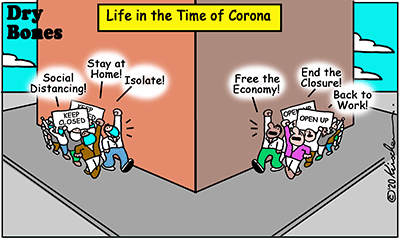Ruthie Blum: Israel is a country, not a concept - opinion
WHICH BRINGS us to one peculiar side effect of the COVID-19 pandemic: a spike in the desire of Israelis living abroad to return home, and an increase in the interest of Diaspora Jews to make aliyah.
According to Jewish Agency Chairman Isaac Herzog, the government should prepare for a “major wave of immigration to Israel when the coronavirus crisis ends.”
In a recent interview, Herzog referred to the fact that Jewish communities around the world have been hit hard both by the virus and by the antisemitism that it has evoked. He said that the Jewish Agency has been receiving thousands of inquiries from Israelis, and hundreds from British, French and American Jews.
Two families who arrived this month – a couple from France and the Israeli parents of American-born children returning after a 14-year stint in New York – told Channel 12 on Wednesday that a major factor in the timing of their move was Israel’s handling of the pandemic. Both said they felt far safer in Israel, from a health standpoint, than in the US and Europe. The now former New Yorkers pointed to all the people in Brooklyn “who are dying like flies.”
The French wife stated that Israel, unlike her country of origin, does not have a shortage of surgical masks.
Two young Israeli men studying in Italy who came rushing back when the crisis struck expressed the same sentiment. One told Channel 12 that he used to take Israel for granted, but when he witnessed Italian hospital staff refusing to provide ventilators to any patient over the age of 60, he had an awakening.
“Even if Israel ran out of equipment, it would find a way to acquire the machines before letting anyone die,” he said.
It’s a great lesson for all the Israelis who have been whining and winging about the country’s “disastrous” healthcare system in general and the Health Ministry’s “poor” management of the COVID-19 crisis in particular. Sadly, it’s a message most of us won’t hear, especially not now, when the decreasing number of patients on ventilators has enabled us to focus the brunt of our anxiety on the decimated economy.
Caroline Glick: The final days of the Iran nuclear deal
First and foremost, the US will benefit if the administration invokes the snapback sanctions articles because it is the right thing to do. As the IAEA reported and Salehi acknowledged, the Iranians are comprehensively breaching all of their commitments under the JCPOA. There is no substantive justification for maintaining the fiction that the deal is still salvageable. There is clearly no substantive justification for selling Iran conventional weapons.Dr. Martin Sherman: Haaretz – One outrage too far?
This brings us to the second reason, and to Iran's defenders – particularly the EU and the Democrats:
If the US triggers the snapback sanctions, the move will critically harm the European Union which, under German leadership has consistently advanced a harshly anti-American foreign policy. If the EU responds to a US move to trigger the snapback sanctions by insisting the US has no authority to act, the position will boomerang.
Even before the appearance of the coronavirus pandemic, many EU member nations were rejecting the EU's authority to dictate a unified anti-American, pro-Iranian foreign policy.
In February 2019, Poland co-hosted a summit on Iran in Warsaw with the US. Then EU Foreign Policy Commissioner Federica Mogherini refused to participate in the conference that bought more than a dozen key EU states along with Israel, Saudi Arabia, and the UAE together to discuss the threat Iran poses to global security.
The EU's utter failure to manage the coronavirus pandemic has struck a massive blow to the EU. Its incompetence has convinced millions of Europeans who had previously supported the EU that they have nothing to gain from it. Their national governments are the only instruments to protect their lives and liberty.
The EU's weakened was apparent earlier this month when several EU member states angrily rejected an attempt by current EU foreign policy commissioner Josep Borrell to pass a resolution condemning the Trump Middle East peace plan and Israel's intention to apply its law to parts of Judea and Samaria in the framework of the Trump plan.
If the EU subverts a US effort to restore UN sanctions on Iran, its action is liable to destroy whatever is left of Brussel's power to dictate a unified EU foreign policy.
For Miriam Peretz, there is one goal in life: Sanctification of death—Rogel Alpher, Haaretz, April 28, 2020, (from the Hebrew).
From the Al-Qassam Brigades to the Zionist soldiers: The Al-Qassam Brigades love death more than you love life.—Hamas’s Al-Aqsa TV,Nov. 18, 2012.
Explode, onward, explode, and let your soul be liberated.…How beautiful the [explosive] belt is on your waist; anyone who faces you as an enemy will be humiliated. Water your land with blood, when your weapon speaks. Smile on the day of your death as a Martyr…Onward to Paradise, and Allah is the one who will remain for your children—Hamas’s Al-Aqsa TV, Nov. 12, 2019.
Of course, Haaretz, an allegedly “Israeli” daily, has every right to print whatever depraved drivel and reprehensible rubbish it wishes. It must, however, be prepared to bear the commercial consequences thereof.
For decades, under the ludicrous—indeed, almost lewd—pretext of being the “paper for thoughtful readers”, it has given a platform for the grotesque garbage, noxious nonsense and preposterous poppycock of the likes of Gideon Levy and Amira Hass, who regularly condone—or at least, express sympathetic understanding for—Palestinian-Arab terror attacks against Israel/Israelis—while demeaning, de-legitimizing and demonizing Israeli punitive and preemptive countermeasures against them.
But this week (April 28)—on National Memorial Day, when Israel remembers its fallen warriors, it might just have carried its caustic crusade against the Jewish state one outrage too far. On what is arguably the most hallowed date on the national calendar, Haaretz chose to publish a toxic tirade by its arrogant and pompous TV critic, one Rogal Alpher, against Miriam Peretz, arguably one of Israel’s most noble public figures. A twice bereaved mother, Peretz lost two of her sons, Uriel and Eliraz, both IDF officers, killed in action, and her husband, Eliezer, who died at the age of 56, shortly after the death of Uriel, his eldest son—reportedly from an illness brought on by the grief over his loss.
For many, Peretz has become a symbol of the ability to rise above personal sorrow and tragedy and to rally the strength to contribute to others and to Israeli society at large, devoting her life to educating youth and young IDF soldiers on Jewish and Zionist values.








































